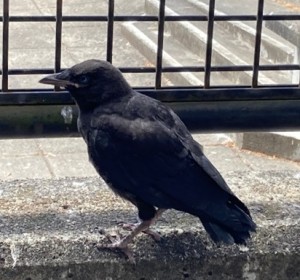“I was there to hear your borning cry, I’ll be there when you are old.
I rejoiced the day you were baptized, to see your life unfold.”
Borning Cry, John Ylvisaker
Beloved of God,
There’s a crow “cawing” outside my office window at Peace right now. A young bird, newly fledged, he’s trying to figure out what life is supposed to look like and how it’s supposed to work after one leaves the nest.
 I discovered him yesterday evening as I was rolling my bike out the door to head for home. There he was, hanging out by the railing, unperturbed as I stepped out right next to him. Not used to such nonchalance on the part of crows, I asked him what was going on. He gave no reply, but I did hear a distinct call from the tree in the neighbor’s yard across the street—the kind of insistent call that used to echo through the neighborhood when we scattered Kindem kids were being called home for dinner. We all knew what that signal meant; knew that we ought to come without delay. But this juvenile crow?
I discovered him yesterday evening as I was rolling my bike out the door to head for home. There he was, hanging out by the railing, unperturbed as I stepped out right next to him. Not used to such nonchalance on the part of crows, I asked him what was going on. He gave no reply, but I did hear a distinct call from the tree in the neighbor’s yard across the street—the kind of insistent call that used to echo through the neighborhood when we scattered Kindem kids were being called home for dinner. We all knew what that signal meant; knew that we ought to come without delay. But this juvenile crow?
I reached out with the toe of my shoe to gently prod him off the porch, but he only waddled a few steps forward. Are you injured? I asked. Again, no reply. I prodded once more and watched as he stretched his wings long enough to glide down to the landing below the stairs. His wings seemed to work fine. No injury, as far as I could tell. Again I heard the insistent calling from the tree across the street: CAW!! CAW—CAW—CAW!!! And then his weaker reply: CAW! Finally leaving my new young acquaintance, I headed for home… AND… when I arrived back at church this morning, there he was – still; companioned this time by one of his siblings (who was further along the flight curve than he) and a parent crow, who took to CAWING at me vociferously as I tried with soothing tones to let her know that I meant no harm. Walking past the three crows I went inside to learn more about the behavior I was observing.
Internet bird sites confirmed that young fledgling crows will spend quite a lot of time on the ground over the span of one-two weeks as they go through the crucial phase of learning how to fly and self-feed. Once they leave the nest, there is no return. Crow parents are extremely protective of their young ones at this time, leading to behavior such as dive-bombing. Well, I haven’t been dive bombed yet—so perhaps Mother crow has caught the drift that I bear her fledgling no ill will. With a little luck and parental vigilance, I’m hopeful that my young friend will find his way in the world.
August is the time of year when many young persons, too, are engaging transitions of one sort or another. Venturing off to a new school. Getting accustomed to the new body that puberty has wrought. Going on road trips. Venturing toward a post-college life or career. Or, perhaps, pledging themselves to another – “till death do us part.” Life at this crossroads —for human beings as well as crow-kind—can feel precarious. As Poet Michael Meade has said:
It’s our knowledge of death that makes us pray. Every path a child takes looks precarious to the parent’s eye.
And it is, and “precarious” is an old word which means “full of prayers.”
After 65+ years on God’s good Earth, I’m still musing about what I want to be when I grow up. At times I find myself wondering, as that young crow must, what life is supposed to look like and how it’s supposed to work at this time of my life. So the journey continues. And, thanks be to God, we don’t have to make that journey alone. For we are accompanied by the one who said: I will not leave you orphaned. I am with you always.
With you on the Way.
Pastor Erik




